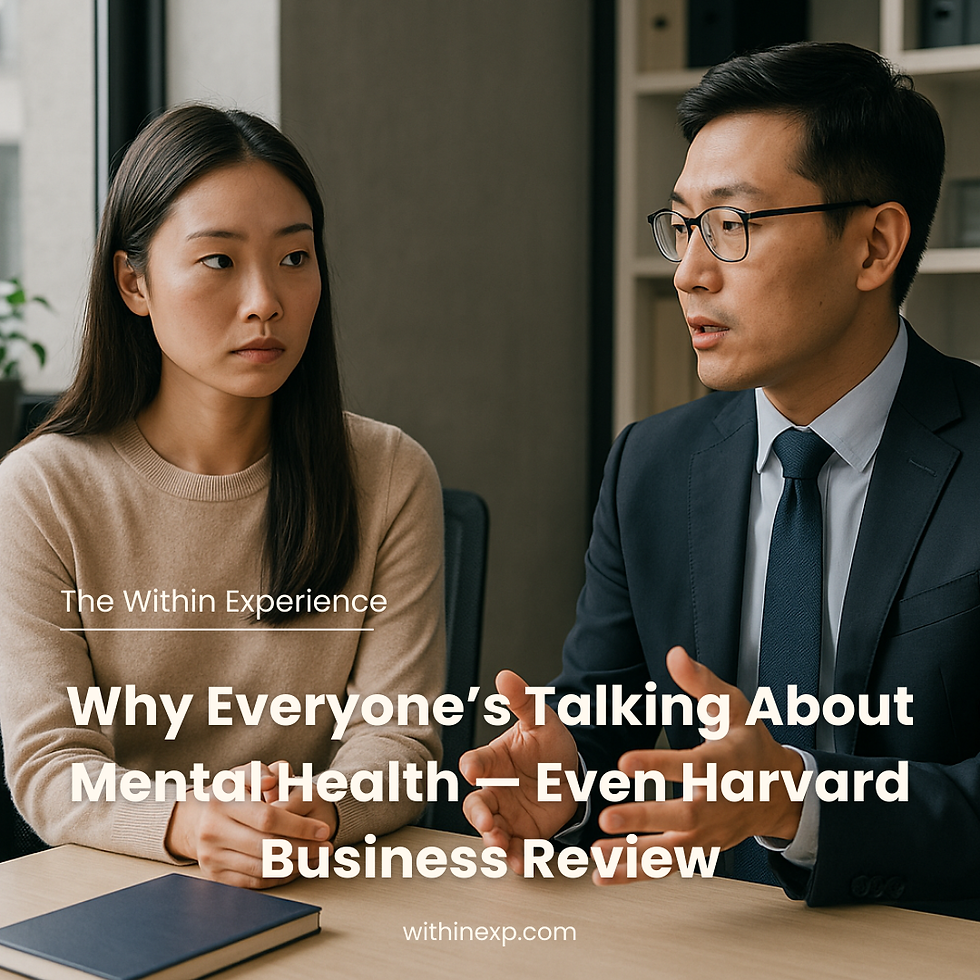Why Everyone’s Talking About Mental Health — Even Harvard Business Review
- The Within Experience

- May 19, 2025
- 2 min read
Scroll through your LinkedIn or Instagram feed lately and you’ll notice something different.
Harvard Business Review, Business Insider, McKinsey, and even AI tools like ChatGPT are all pushing out content on mental health.
These aren’t isolated posts — they’re part of a growing pattern. From burnout and therapy to emotional intelligence and psychological safety, mental wellbeing is now a core conversation in business, leadership, and culture.
But what does this tell us? And why should you pay attention?

A Cultural Shift in Real Time
In the past, mental health was something people whispered about — especially in high-achieving environments like finance, law, tech, or entrepreneurship. Today, that silence is breaking.
According to Google Trends, global searches for "therapy" reached an all-time high in 2022 and remain significantly elevated. Searches for “signs of burnout” have increased more than 500 percent over the past decade.
Even ChatGPT, originally designed for productivity and automation, is now being used by millions for emotional support and companionship. In a 2023 study by the MIT Sloan School of Management, researchers found that users were engaging with AI in deeply personal ways, often seeking guidance, affirmation, or relief from stress and anxiety.
These numbers aren’t just digital noise. They reflect a rising emotional need — and a growing willingness to talk about it.
When High Performers Start Turning Inward
When Harvard Business Review — the go-to platform for executives, consultants, and ambitious professionals — starts publishing article after article on inner clarity, emotional regulation, and psychological safety, it signals something bigger:
Mental health is no longer a soft topic.It’s a leadership topic.A productivity topic.A human topic.
As high-functioning professionals begin asking deeper questions — about identity, boundaries, and what it means to feel “whole” rather than just “successful” — the cultural tone shifts with them.
People are no longer just asking, “How do I get ahead?” They’re asking:
— What’s the emotional cost of this pace?
— Why do I feel numb even when I’m achieving?
— Who am I outside of my roles?
Especially in High-Pressure Cities Like Hong Kong and Singapore
In fast-moving cities where ambition is a norm and emotional silence is the default, this shift is even more striking.
Many professionals in Hong Kong, Singapore, and Seoul have grown up learning to equate performance with worth. They’ve been trained to keep their inner world private — sometimes even from themselves.
But more of them are turning inward now. Not because they’re in crisis. But because they’re ready to live with more clarity, presence, and self-awareness.
Emotional Skills Are the New Status Symbols
It’s no longer impressive to be burned out. It’s impressive to be grounded.To know when to pause.To lead with emotional intelligence.To build a life — not just a resume.
In 2024, emotional wellbeing is fast becoming a form of self-leadership.Not weakness.Not indulgence.Strength.
Final Thought
This isn’t a trend.It’s a return to something essential.
If the world’s top thinkers and highest achievers are prioritizing mental health. What does that tell you about what really matters?
Curious about where to start? You don’t need to be in crisis to seek support. You just need to be ready to meet yourself more honestly.
Explore therapy, find a counsellor, or join our community events — all designed for high-functioning professionals who are finally ready to turn inward.





Comments